Objets Κέντρον Ερεύνης Ελληνικής Φιλοσοφίας
<< 10
10 >>
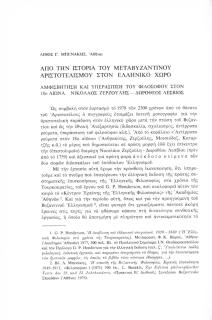
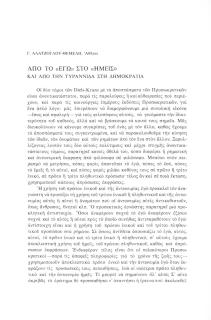
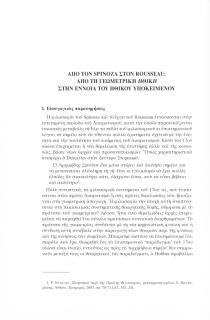
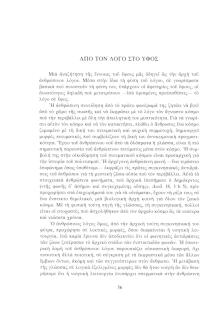
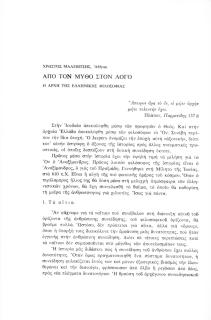
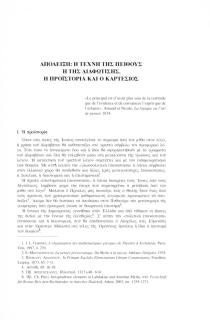
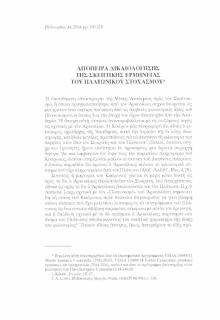
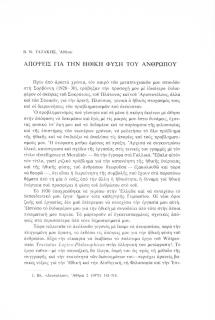
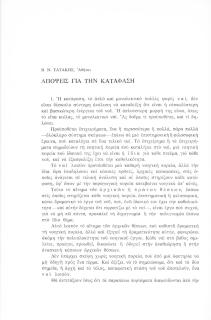
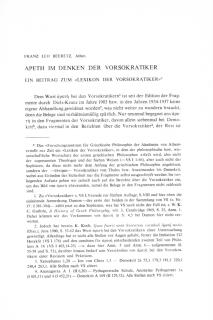
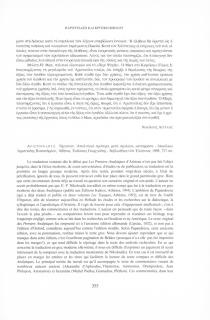
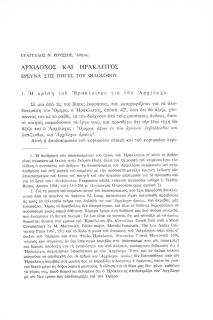 << 10
10 >>
<< 10
10 >>
Total: 4244

Από την ιστορία του μεταβυζαντινού Αριστοτελισμού στον ελληνικό χώρο. Αμφισβήτηση και υπεράσπιση του φιλοσόφου στον 18ο αιώνα. Νικόλαος Ζερζούλης - Δωρόθεος Λέσβιος
Ενότητα: Άρθρα του περιοδικού "Φιλοσοφία"
Im Rahmen einer umfangreichen Untersuchung über die aristotelische Tradition im griechischen Raum von der nachbyzantinischen Zeit bis zur Befreiung Griechenlands (17.-18. Jahrhundert), welche als Beitrag zum Aristoteles-Jahr 1978 erscheinen soll, werden bisher unedierte Texte vorgelegt, namentlich solche eines philosophischen Disputs zwischen zwei wenig bekannten, obwohl bedeutenden Philosophielehrern und Autoren über aristotelische Thesen. Die Kontrahenten sind Dorotheos von Mitylene († 1770) und der aus Metsovo in Epirus stammende Nikolaos Zer- zouli s († ca. 1773). Ersterer ist der langjährige Philosophielehrer und Direktor der Aka¬demie des Patriarchats zu Konstantinopel (1721-26, 1726-32, 1748-59), der ein großes Ansehen bei seinen Zeitgenossen und in den späteren Jahrzehnten genoß (siehe z.B. die Erwähnung bei Lord Byron, Childe Harold΄s Pilgrimage, 1811). Er ist einer der letzten Vertreter der traditionelen Philosophie, einer philosophischen Schulung, welche hauptsächlich auf die Autorität der aristotelischen Lehren sowohl in der L...
Από το «Ἐγὠ» στο «Ἡμεῖς»
Ενότητα: Άρθρα του περιοδικού "Φιλοσοφία"
Reading over Die Fragmente der Vorsokratiker by Diels-Kranz, one no¬tices that the earlier Presocratics, when expressing their personal views, use the first person singular and the pronoun I, while the later ones use the first person plural plus the pronoun «we» or any equivalent impersonal form. The former also use the pronoun «he» or «they» and the corresponding third person singular or plural, when they refer to the «mortals», i.e. to the common people, besides they feel distant and superior from the common people and show contempt for them. On the contrary, the latter do not make any distinction between the common people and their own wise ego; they feel equal to the «mortals» and express themselves in the first person plural, or in impersonal form; they generally speak in the name of everybody and not in the name of a few wise men. Xenophanes, Heraclitus, Parmenides and Empedocles are included in the first group, the «philosophers of 1», while Zeno, Melissos, Anaxagoras, Diogenes of Apollonia and Democritos to the second group, the «...
Από τον Spinoza στον Rousseau: Από τη γεωμετρική ηθική στην έννοια του ηθικού υποκειμένου
Ενότητα: Άρθρα του περιοδικού "Φιλοσοφία"
In the history of philosophy from Spinoza to Kant the problem arises concerning the transition from the production of systems ordine geometrico to formulating the concept of the autonomous subject, which entails a rethinking of the terms and the limits of theoretical and practical Reason. The present paper undertakes to examine this historical question through the medium of the relation between Spinoza and Rousseau. To summarize, what we shall endeavour to maintain is that between Spinoza and Rousseau significant conceptual modifications took place, primarily because of a change in the situational condition of humans: whereas in Spinoza's system the human being was a part of nature and subject to natural laws, in the theory of Rousseau human will occupies centre stage. Nevertheless, although there is a different «centre of gravity» in the respective theoretical constructs of the two thinkers, what is common to both is the pursuit of the good. In Spinoza its foundations are in the metaphysical presuppositions of his epistemology; in Roussea...
Από τον λόγο στο ύφος
Ενότητα: Άρθρα του περιοδικού "Φιλοσοφία"
Human language in all its achievements is a sensuous and an intellectual form of expression. Even in highly developed languages, there is a language of emotions side by side with conceptual language. Reason alone is a very inadequate mean to express human culture in all its richness. This inherent feature of language becomes a starting point for style: the two sources of language —emotional and conceptual— have an unlimited variety in their connection, which serves the variation and originality of linguistic forms. The interrelation of language and thought is another fundamental characteristic of language, which may also be a starting point for style. From early Greek thought the relation between language and thought was a crucial problem. Plato complained of the inadequacy of language, since for him the words are only the first step of knowledge. In recent centuries the problem was approached from another angle. Linguists and philosophers of our times empasized the decisive influence that language has upon thought — although this idea is...
Από τον μύθο στον λόγο. Η αρχή της ελληνικής Φιλοσοφίας
Ενότητα: Άρθρα του περιοδικού "Φιλοσοφία"
Greek philosophy was born in Miletos. The conditions which facilitated the emergence of this possibility inscribed in human consciousness are of course those which determined the specific position of Miletos at that period of history, that is the establishment of democracy and free thinking together with the world-wide commercial relations. We have however to sress this point : living on commerce means living with abstract concepts as prices, exchange of products on the basis of market values etc. The inherent value of a product is transformed into ex¬ternal exchange value. This fact apparently promotes abstract thinking. Thales and Anaximander were eminent personalities of this community of merchants. The early Greek philosophy was searching for the «arche» (first principle, originating cause, starting-point). This direction of philosophy was strongly conditioned by the previous mythical way of thinking. Hesiod is the link between mythical tradition and the new way of thinking on philosophical terms. We can trace the philosophical «arch...
Απόδειξη: Η τέχνη της πειθούς ή της διαφώτισης. Η προϊστορία και ο Καρτέσιος
Ενότητα: Άρθρα του περιοδικού "Φιλοσοφία"
Δεν υπάρχει περιγραφή
Απόπειρα δικαιολόγησης της Σκεπτικής ερμηνείας του πλατωνικού στοχασμού
Ενότητα: Άρθρα του περιοδικού "Φιλοσοφία"
The paper offers a new approach for reading Plato's dialogues. As it is well known, traditional reading of the dialogues presupposes as a fact that Plato insisted on the theory of ideas and believed that human knowledge is possible and attainable. This traditional view therefore considers Plato as a dogmatist and rejects legitimacy of Arcesilaus' «sceptical turn» of the middle Academy. However, evidence for the disavowal of Arcesilaus claim of returning philosophy back to its roots (to Socrates and Plato) is not that straightforward and unproblematic. In this paper it is argued that Arcesilaus' «sceptical turn» might be in agreement not only with the aporetic dialogues but also with middle «dogmatic» dialogues of Plato, namely the Republic and Meno. The first part concerns the overall character of platonic writings as well as the intelectual atmosphere in the Academy. Its aim is to suggest that no rigid metaphysical doctrine seems to be implied. The main argument for this position is the absence of a consistent Platonic doctrine in the di...
Απόψεις για την ηθική φύση του ανθρώπου
Ενότητα: Άρθρα του περιοδικού "Φιλοσοφία"
Dans une brève introduction l’auteur expose les raisons de son article, à savoir : son intérêt à la Morale, témoigné depuis ses études post - universitaires, et la lecture de Tractatus Logico – Philosophicus de Wittgenstein. Point de départ aux analyses qui suivent est la notion de vertu chez Platon. La vertu y est en corrélation avec celle de la science. L’adage «la vertu est une science» ne signifie pas plutôt que les deux termes sont équivalents, mais que le premier fonde le second (cf. Ménexène 246 e). Cherchant à montrer la valeur primordiale, mise en évidence par Platon, de la relation entre la moralité et l’intelligence, l’auteur se réfère aux sciences de la Psychologie et de la Morale de nos jours, où il constate le divorce avec la Philosophie, l’exagération et l’arbitraire des recherches, causés par l’esprit positiviste qui élimine les notions de psyché et de consience morale. La question si la vertu peut être enseignée, qui est la question préliminaire dans l’analyse des rapports entre la moralité et l’intelligence, est attaquée...
Απόψεις για την κατάφαση
Ενότητα: Άρθρα του περιοδικού "Φιλοσοφία"
L’affirmation est l’acte essentiel et fondamental de l’esprit humain. Elle présuppose une série d’arguments et sollicite certaines positions antérieures sur lesquelles elle s’appuie, qu’elle justifie, ou même, qu’elle réfute. Aussi, résulte-t-elle d’un processus noétique qui se caractérise d’une part par un idéal d’universalité, une universalité qui reste toujours un idéal inaccessible, et d’autre part par un certain aspect dramatique et complexe qui relève du postulat des premiers principes. L’auteur envisage ici toute la problématique incluse dans le postulat des premiers principes et ensuite passé à l’examen du rôle de la déduction et de l’induction, méthodes qui selon lui s’appuient l’une sur l’autre et ne permettent pas de les voir comme des voies contraires et totalement séparées. En second lieu, l’affirmation présuppose une certaine impulsion qui témoigne la subjective de l’œuvre de l’esprit, ce qui rend plus dramatique cet œuvre. Cet élan intérieur se manifeste dans une multiplicité de formes, lesquelles se proposent d’affirmer l...
Αρετή im Denken der Vorsokratiker. Ein Beitrag zum «Lexikon der Vorsokratiker»
Ενότητα: Άρθρα του περιοδικού "Φιλοσοφία"
Σκοπός της μελέτης είναι να φανή το περιεχόμενο και η σημασία του όρου αρετή στη σκέψη των Προσωκρατικών. Η αρχαιότερη χρήση του μας είναι γνωστή από τον Ξενοφάνη 1,20 με τη σημασία της ηθικής αξίας ή και της ίδιας της ηθικότητας. Με την ίδια περίπου σημασία ενδέχεται να είχε χρησιμοποιηθή και από τον Αναξαγόρα, μαρτ. 1. Στον Ίωνα το Χίο 20 ο όρος μαρτυρείται με την οντική σημασία της πληρότητας, ενώ στους Πυθαγόρειους με τη σημασία της ηθικής ιδιότητας. Τέλος στο Δημόκριτο, που τα σωζόμενα αποσπάσματά του προσφέρουν τις πιο πολλές και τις πιο ποικίλες χρήσεις, βρίσκομε τις σημασίες του ηθικά ορθού 181, της δύναμης για πραγμάτωση 248, της τιμής 53a 55 220 263 και της επίτευξης 179, γεγονός που φανερώνει ότι ο Δημόκριτος αποδίδει μεγαλύτερη σημασία στον εσωτερικό χαρακτήρα της έννοιας της αρετής. Συνολικά, στα αποσπάσματα των Προσωκρατικών και στις σχετικές με αυτά μαρτυρίες, όρος αρετή μαρτυρείται 13 φορές. Στις πιο πολλές από αυτές σημαίνει την ηθικότητα γενικά, τρεις φορές σημαίνει την ηθική ιδιότητα, δυό φορές την ορθότητα, τρείς φορέ...
Αριστοτέλους, Όργανον, Αναλυτικά πρότερα, μετά σχολίων, μετάφραση-επιμέλεια Αριστείδης Παπανδρέου, Αθήναι, Εκδόσεις Γεωργιάδης-Βιβλιοθήκη των Ελλήνων, 1995, 737 σσ.
Ενότητα: Άρθρα του περιοδικού "Φιλοσοφία"
Δεν υπάρχει περιγραφή

